Medication Error Prevention Strategies
VerifiedAdded on 2021/04/24
|12
|3551
|45
AI Summary
The provided document appears to be a compilation of research studies and articles related to medication safety and error prevention. It includes references to various papers that discuss strategies for reducing medication errors, such as implementing clinical decision support systems, improving public health through student-led interprofessional education, and addressing the psychological impact on healthcare professionals who experience adverse events. The document also touches on the importance of reporting adverse events and the role of technology in preventing medication errors.
Contribute Materials
Your contribution can guide someone’s learning journey. Share your
documents today.
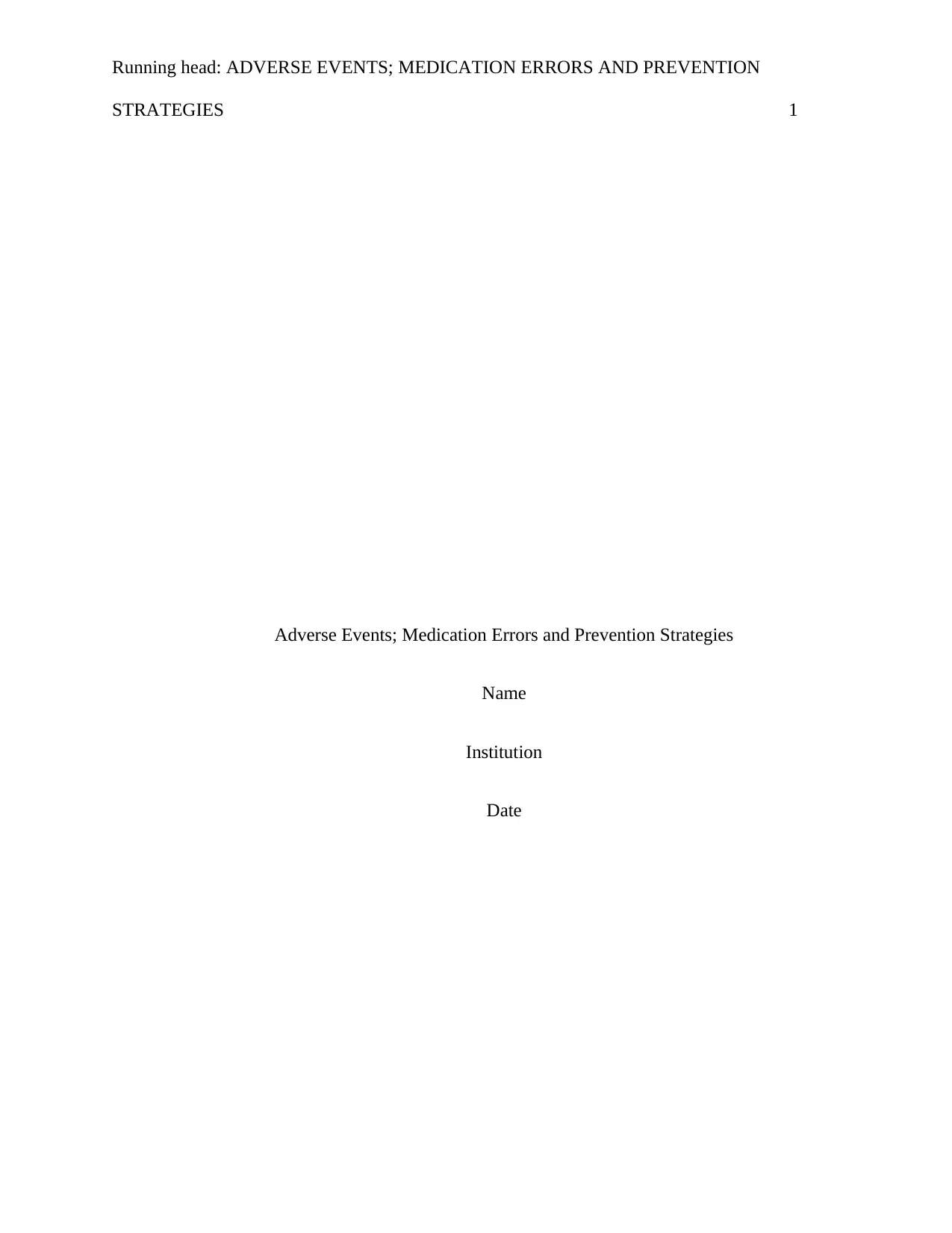
Running head: ADVERSE EVENTS; MEDICATION ERRORS AND PREVENTION
STRATEGIES 1
Adverse Events; Medication Errors and Prevention Strategies
Name
Institution
Date
STRATEGIES 1
Adverse Events; Medication Errors and Prevention Strategies
Name
Institution
Date
Secure Best Marks with AI Grader
Need help grading? Try our AI Grader for instant feedback on your assignments.
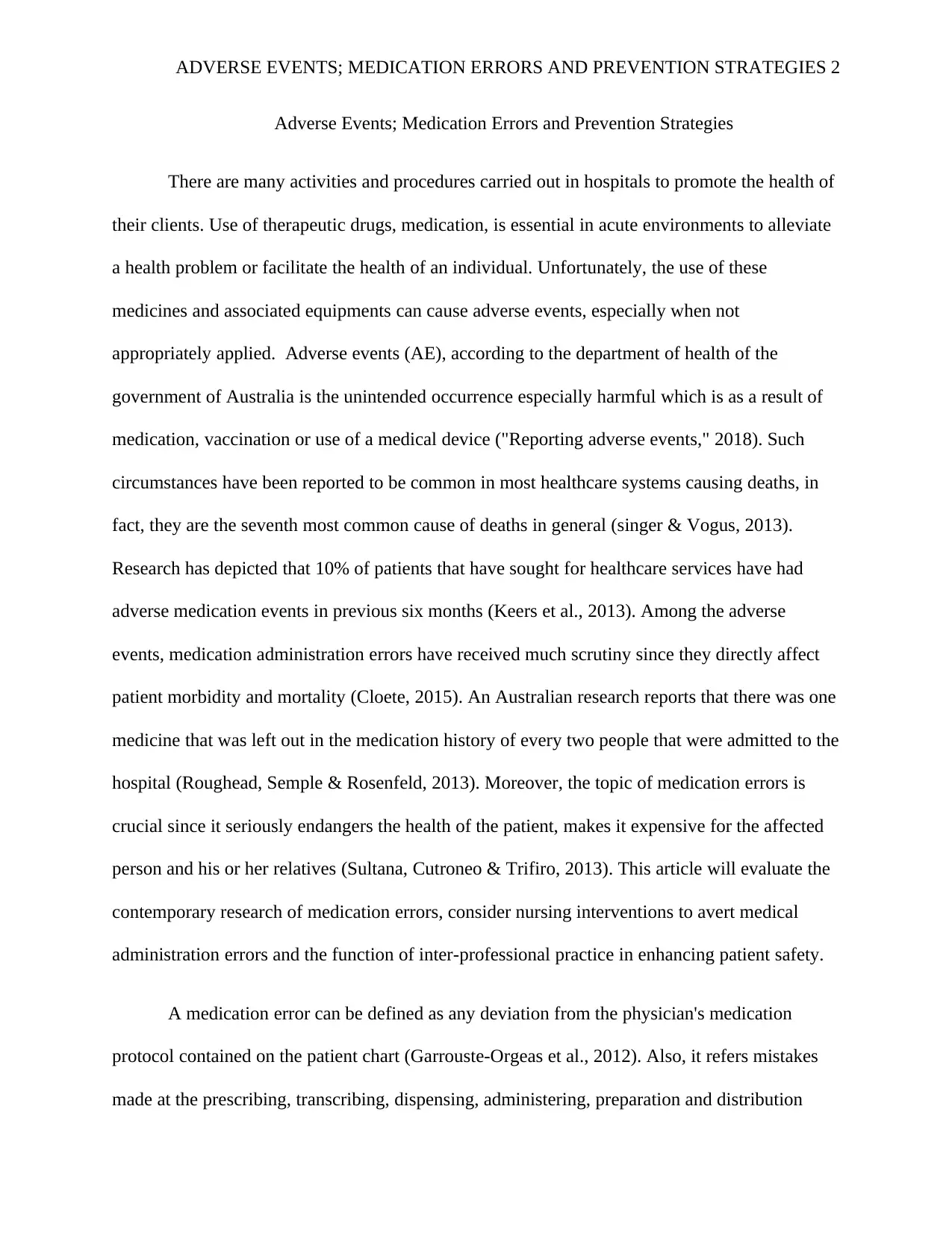
ADVERSE EVENTS; MEDICATION ERRORS AND PREVENTION STRATEGIES 2
Adverse Events; Medication Errors and Prevention Strategies
There are many activities and procedures carried out in hospitals to promote the health of
their clients. Use of therapeutic drugs, medication, is essential in acute environments to alleviate
a health problem or facilitate the health of an individual. Unfortunately, the use of these
medicines and associated equipments can cause adverse events, especially when not
appropriately applied. Adverse events (AE), according to the department of health of the
government of Australia is the unintended occurrence especially harmful which is as a result of
medication, vaccination or use of a medical device ("Reporting adverse events," 2018). Such
circumstances have been reported to be common in most healthcare systems causing deaths, in
fact, they are the seventh most common cause of deaths in general (singer & Vogus, 2013).
Research has depicted that 10% of patients that have sought for healthcare services have had
adverse medication events in previous six months (Keers et al., 2013). Among the adverse
events, medication administration errors have received much scrutiny since they directly affect
patient morbidity and mortality (Cloete, 2015). An Australian research reports that there was one
medicine that was left out in the medication history of every two people that were admitted to the
hospital (Roughead, Semple & Rosenfeld, 2013). Moreover, the topic of medication errors is
crucial since it seriously endangers the health of the patient, makes it expensive for the affected
person and his or her relatives (Sultana, Cutroneo & Trifiro, 2013). This article will evaluate the
contemporary research of medication errors, consider nursing interventions to avert medical
administration errors and the function of inter-professional practice in enhancing patient safety.
A medication error can be defined as any deviation from the physician's medication
protocol contained on the patient chart (Garrouste-Orgeas et al., 2012). Also, it refers mistakes
made at the prescribing, transcribing, dispensing, administering, preparation and distribution
Adverse Events; Medication Errors and Prevention Strategies
There are many activities and procedures carried out in hospitals to promote the health of
their clients. Use of therapeutic drugs, medication, is essential in acute environments to alleviate
a health problem or facilitate the health of an individual. Unfortunately, the use of these
medicines and associated equipments can cause adverse events, especially when not
appropriately applied. Adverse events (AE), according to the department of health of the
government of Australia is the unintended occurrence especially harmful which is as a result of
medication, vaccination or use of a medical device ("Reporting adverse events," 2018). Such
circumstances have been reported to be common in most healthcare systems causing deaths, in
fact, they are the seventh most common cause of deaths in general (singer & Vogus, 2013).
Research has depicted that 10% of patients that have sought for healthcare services have had
adverse medication events in previous six months (Keers et al., 2013). Among the adverse
events, medication administration errors have received much scrutiny since they directly affect
patient morbidity and mortality (Cloete, 2015). An Australian research reports that there was one
medicine that was left out in the medication history of every two people that were admitted to the
hospital (Roughead, Semple & Rosenfeld, 2013). Moreover, the topic of medication errors is
crucial since it seriously endangers the health of the patient, makes it expensive for the affected
person and his or her relatives (Sultana, Cutroneo & Trifiro, 2013). This article will evaluate the
contemporary research of medication errors, consider nursing interventions to avert medical
administration errors and the function of inter-professional practice in enhancing patient safety.
A medication error can be defined as any deviation from the physician's medication
protocol contained on the patient chart (Garrouste-Orgeas et al., 2012). Also, it refers mistakes
made at the prescribing, transcribing, dispensing, administering, preparation and distribution
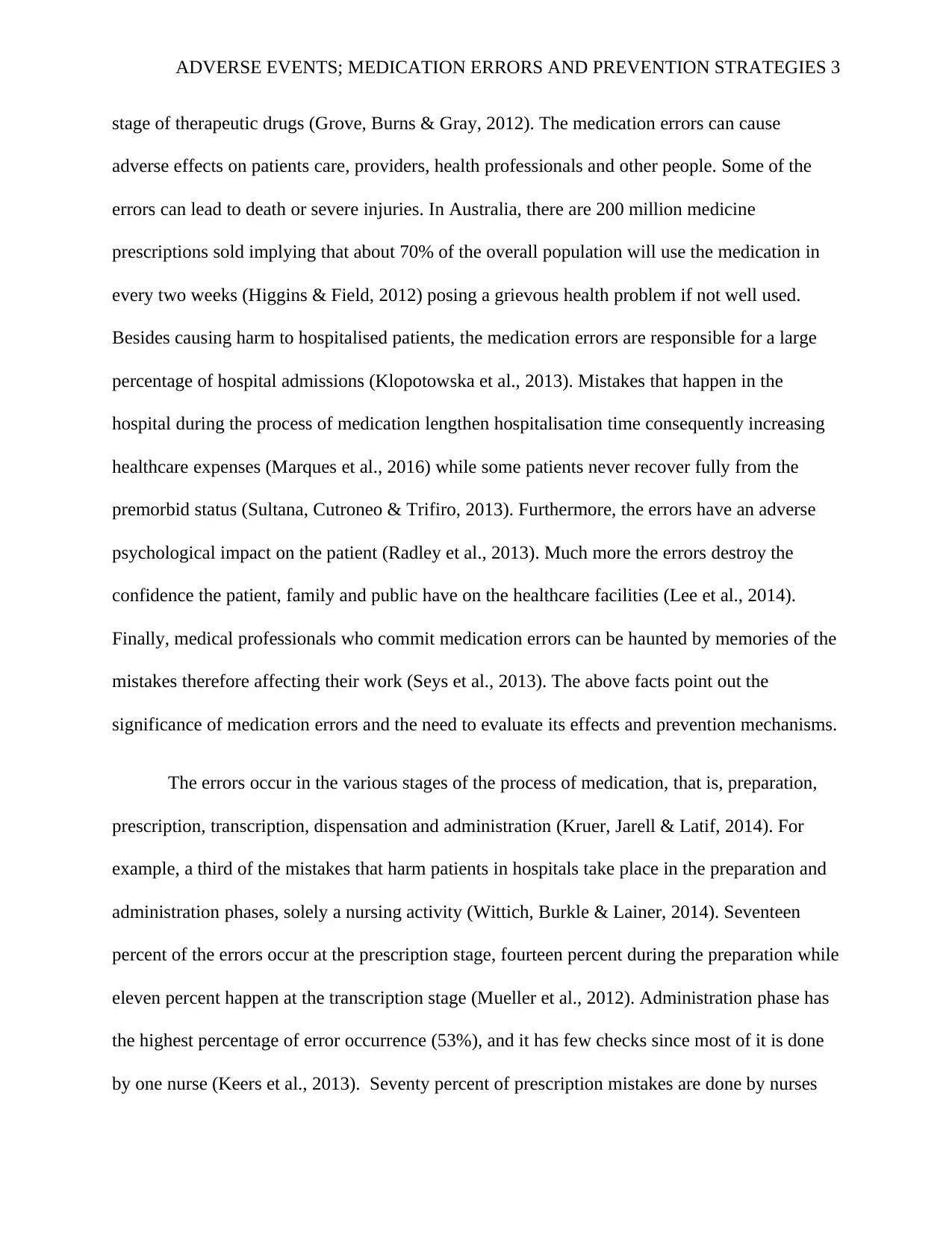
ADVERSE EVENTS; MEDICATION ERRORS AND PREVENTION STRATEGIES 3
stage of therapeutic drugs (Grove, Burns & Gray, 2012). The medication errors can cause
adverse effects on patients care, providers, health professionals and other people. Some of the
errors can lead to death or severe injuries. In Australia, there are 200 million medicine
prescriptions sold implying that about 70% of the overall population will use the medication in
every two weeks (Higgins & Field, 2012) posing a grievous health problem if not well used.
Besides causing harm to hospitalised patients, the medication errors are responsible for a large
percentage of hospital admissions (Klopotowska et al., 2013). Mistakes that happen in the
hospital during the process of medication lengthen hospitalisation time consequently increasing
healthcare expenses (Marques et al., 2016) while some patients never recover fully from the
premorbid status (Sultana, Cutroneo & Trifiro, 2013). Furthermore, the errors have an adverse
psychological impact on the patient (Radley et al., 2013). Much more the errors destroy the
confidence the patient, family and public have on the healthcare facilities (Lee et al., 2014).
Finally, medical professionals who commit medication errors can be haunted by memories of the
mistakes therefore affecting their work (Seys et al., 2013). The above facts point out the
significance of medication errors and the need to evaluate its effects and prevention mechanisms.
The errors occur in the various stages of the process of medication, that is, preparation,
prescription, transcription, dispensation and administration (Kruer, Jarell & Latif, 2014). For
example, a third of the mistakes that harm patients in hospitals take place in the preparation and
administration phases, solely a nursing activity (Wittich, Burkle & Lainer, 2014). Seventeen
percent of the errors occur at the prescription stage, fourteen percent during the preparation while
eleven percent happen at the transcription stage (Mueller et al., 2012). Administration phase has
the highest percentage of error occurrence (53%), and it has few checks since most of it is done
by one nurse (Keers et al., 2013). Seventy percent of prescription mistakes are done by nurses
stage of therapeutic drugs (Grove, Burns & Gray, 2012). The medication errors can cause
adverse effects on patients care, providers, health professionals and other people. Some of the
errors can lead to death or severe injuries. In Australia, there are 200 million medicine
prescriptions sold implying that about 70% of the overall population will use the medication in
every two weeks (Higgins & Field, 2012) posing a grievous health problem if not well used.
Besides causing harm to hospitalised patients, the medication errors are responsible for a large
percentage of hospital admissions (Klopotowska et al., 2013). Mistakes that happen in the
hospital during the process of medication lengthen hospitalisation time consequently increasing
healthcare expenses (Marques et al., 2016) while some patients never recover fully from the
premorbid status (Sultana, Cutroneo & Trifiro, 2013). Furthermore, the errors have an adverse
psychological impact on the patient (Radley et al., 2013). Much more the errors destroy the
confidence the patient, family and public have on the healthcare facilities (Lee et al., 2014).
Finally, medical professionals who commit medication errors can be haunted by memories of the
mistakes therefore affecting their work (Seys et al., 2013). The above facts point out the
significance of medication errors and the need to evaluate its effects and prevention mechanisms.
The errors occur in the various stages of the process of medication, that is, preparation,
prescription, transcription, dispensation and administration (Kruer, Jarell & Latif, 2014). For
example, a third of the mistakes that harm patients in hospitals take place in the preparation and
administration phases, solely a nursing activity (Wittich, Burkle & Lainer, 2014). Seventeen
percent of the errors occur at the prescription stage, fourteen percent during the preparation while
eleven percent happen at the transcription stage (Mueller et al., 2012). Administration phase has
the highest percentage of error occurrence (53%), and it has few checks since most of it is done
by one nurse (Keers et al., 2013). Seventy percent of prescription mistakes are done by nurses
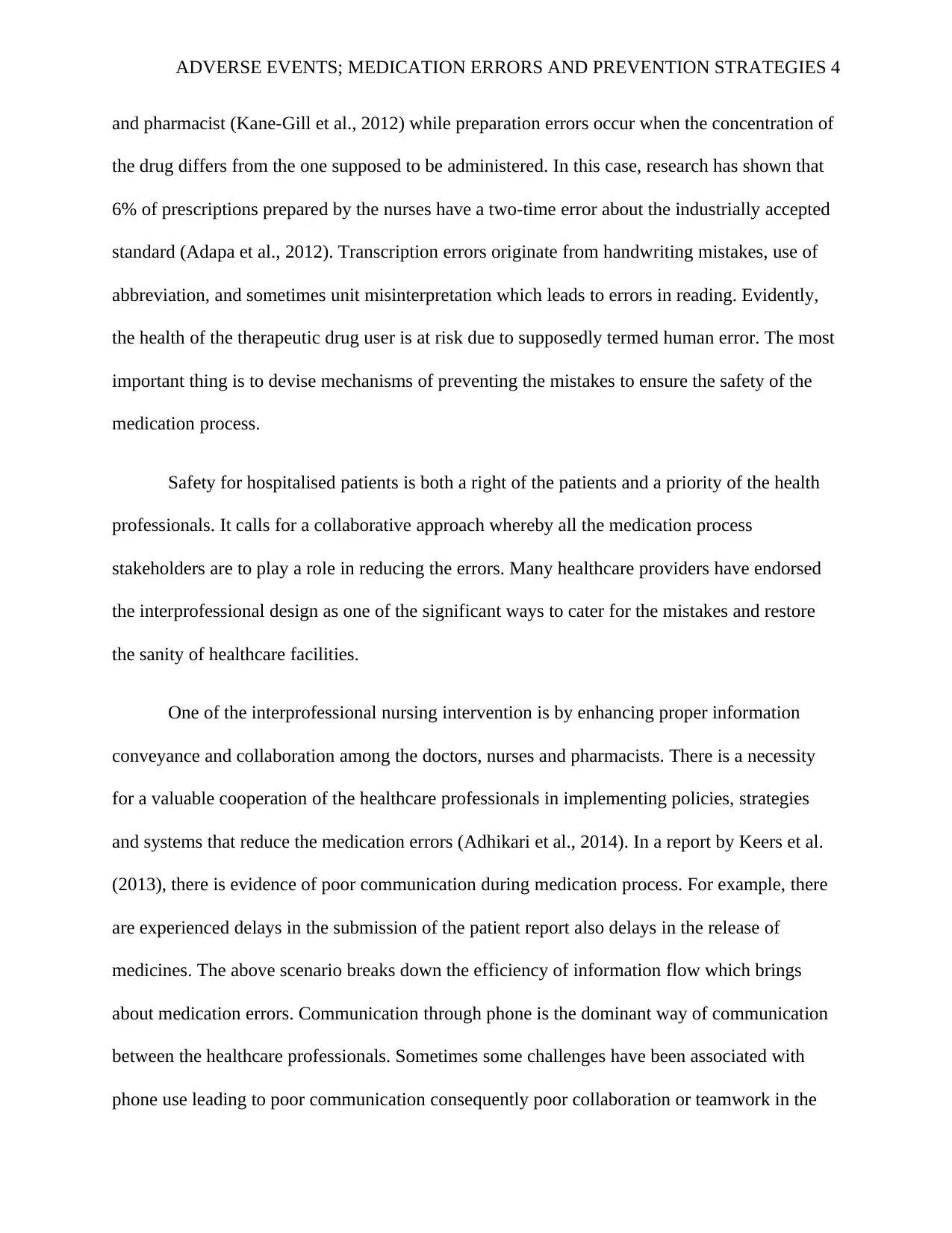
ADVERSE EVENTS; MEDICATION ERRORS AND PREVENTION STRATEGIES 4
and pharmacist (Kane-Gill et al., 2012) while preparation errors occur when the concentration of
the drug differs from the one supposed to be administered. In this case, research has shown that
6% of prescriptions prepared by the nurses have a two-time error about the industrially accepted
standard (Adapa et al., 2012). Transcription errors originate from handwriting mistakes, use of
abbreviation, and sometimes unit misinterpretation which leads to errors in reading. Evidently,
the health of the therapeutic drug user is at risk due to supposedly termed human error. The most
important thing is to devise mechanisms of preventing the mistakes to ensure the safety of the
medication process.
Safety for hospitalised patients is both a right of the patients and a priority of the health
professionals. It calls for a collaborative approach whereby all the medication process
stakeholders are to play a role in reducing the errors. Many healthcare providers have endorsed
the interprofessional design as one of the significant ways to cater for the mistakes and restore
the sanity of healthcare facilities.
One of the interprofessional nursing intervention is by enhancing proper information
conveyance and collaboration among the doctors, nurses and pharmacists. There is a necessity
for a valuable cooperation of the healthcare professionals in implementing policies, strategies
and systems that reduce the medication errors (Adhikari et al., 2014). In a report by Keers et al.
(2013), there is evidence of poor communication during medication process. For example, there
are experienced delays in the submission of the patient report also delays in the release of
medicines. The above scenario breaks down the efficiency of information flow which brings
about medication errors. Communication through phone is the dominant way of communication
between the healthcare professionals. Sometimes some challenges have been associated with
phone use leading to poor communication consequently poor collaboration or teamwork in the
and pharmacist (Kane-Gill et al., 2012) while preparation errors occur when the concentration of
the drug differs from the one supposed to be administered. In this case, research has shown that
6% of prescriptions prepared by the nurses have a two-time error about the industrially accepted
standard (Adapa et al., 2012). Transcription errors originate from handwriting mistakes, use of
abbreviation, and sometimes unit misinterpretation which leads to errors in reading. Evidently,
the health of the therapeutic drug user is at risk due to supposedly termed human error. The most
important thing is to devise mechanisms of preventing the mistakes to ensure the safety of the
medication process.
Safety for hospitalised patients is both a right of the patients and a priority of the health
professionals. It calls for a collaborative approach whereby all the medication process
stakeholders are to play a role in reducing the errors. Many healthcare providers have endorsed
the interprofessional design as one of the significant ways to cater for the mistakes and restore
the sanity of healthcare facilities.
One of the interprofessional nursing intervention is by enhancing proper information
conveyance and collaboration among the doctors, nurses and pharmacists. There is a necessity
for a valuable cooperation of the healthcare professionals in implementing policies, strategies
and systems that reduce the medication errors (Adhikari et al., 2014). In a report by Keers et al.
(2013), there is evidence of poor communication during medication process. For example, there
are experienced delays in the submission of the patient report also delays in the release of
medicines. The above scenario breaks down the efficiency of information flow which brings
about medication errors. Communication through phone is the dominant way of communication
between the healthcare professionals. Sometimes some challenges have been associated with
phone use leading to poor communication consequently poor collaboration or teamwork in the
Secure Best Marks with AI Grader
Need help grading? Try our AI Grader for instant feedback on your assignments.
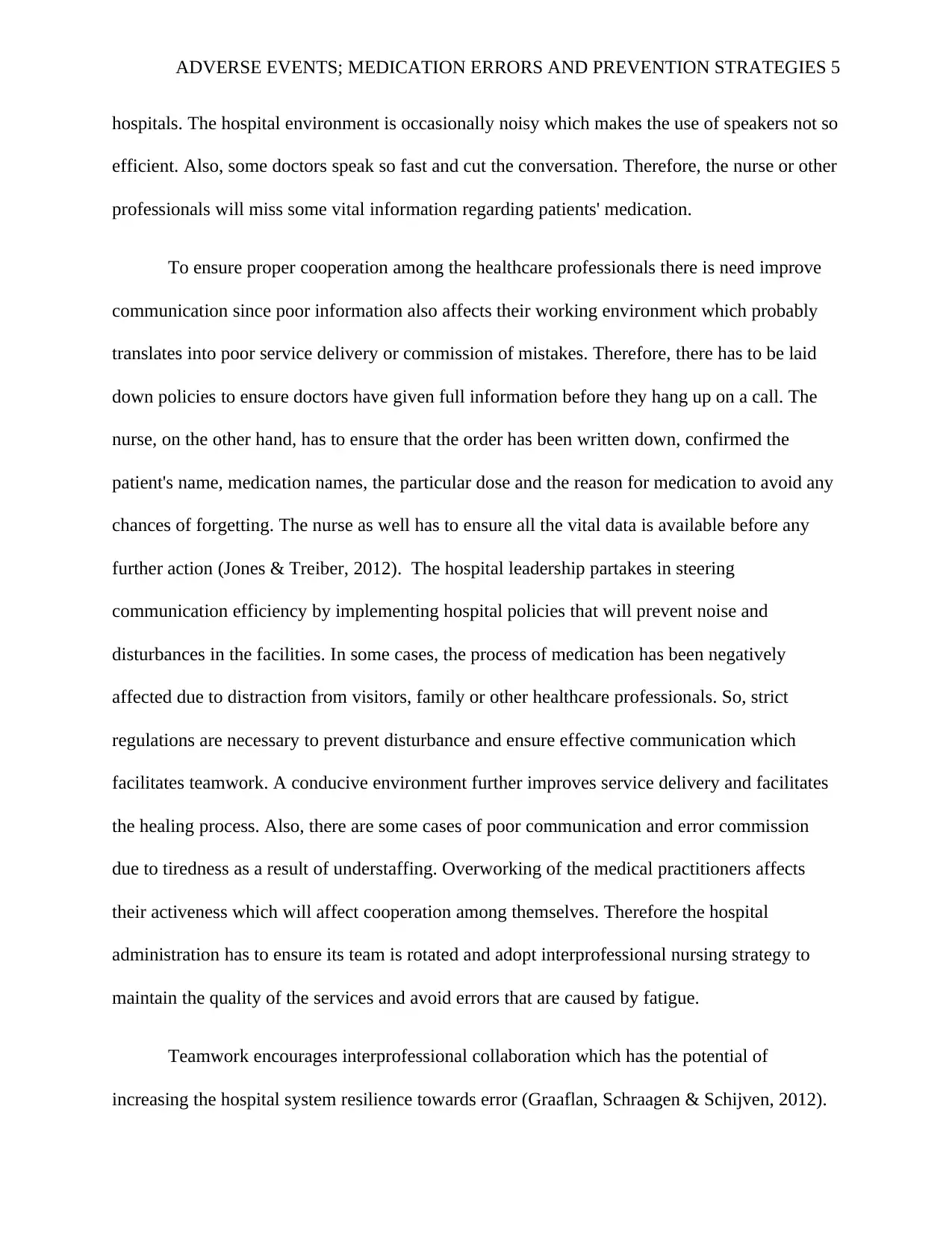
ADVERSE EVENTS; MEDICATION ERRORS AND PREVENTION STRATEGIES 5
hospitals. The hospital environment is occasionally noisy which makes the use of speakers not so
efficient. Also, some doctors speak so fast and cut the conversation. Therefore, the nurse or other
professionals will miss some vital information regarding patients' medication.
To ensure proper cooperation among the healthcare professionals there is need improve
communication since poor information also affects their working environment which probably
translates into poor service delivery or commission of mistakes. Therefore, there has to be laid
down policies to ensure doctors have given full information before they hang up on a call. The
nurse, on the other hand, has to ensure that the order has been written down, confirmed the
patient's name, medication names, the particular dose and the reason for medication to avoid any
chances of forgetting. The nurse as well has to ensure all the vital data is available before any
further action (Jones & Treiber, 2012). The hospital leadership partakes in steering
communication efficiency by implementing hospital policies that will prevent noise and
disturbances in the facilities. In some cases, the process of medication has been negatively
affected due to distraction from visitors, family or other healthcare professionals. So, strict
regulations are necessary to prevent disturbance and ensure effective communication which
facilitates teamwork. A conducive environment further improves service delivery and facilitates
the healing process. Also, there are some cases of poor communication and error commission
due to tiredness as a result of understaffing. Overworking of the medical practitioners affects
their activeness which will affect cooperation among themselves. Therefore the hospital
administration has to ensure its team is rotated and adopt interprofessional nursing strategy to
maintain the quality of the services and avoid errors that are caused by fatigue.
Teamwork encourages interprofessional collaboration which has the potential of
increasing the hospital system resilience towards error (Graaflan, Schraagen & Schijven, 2012).
hospitals. The hospital environment is occasionally noisy which makes the use of speakers not so
efficient. Also, some doctors speak so fast and cut the conversation. Therefore, the nurse or other
professionals will miss some vital information regarding patients' medication.
To ensure proper cooperation among the healthcare professionals there is need improve
communication since poor information also affects their working environment which probably
translates into poor service delivery or commission of mistakes. Therefore, there has to be laid
down policies to ensure doctors have given full information before they hang up on a call. The
nurse, on the other hand, has to ensure that the order has been written down, confirmed the
patient's name, medication names, the particular dose and the reason for medication to avoid any
chances of forgetting. The nurse as well has to ensure all the vital data is available before any
further action (Jones & Treiber, 2012). The hospital leadership partakes in steering
communication efficiency by implementing hospital policies that will prevent noise and
disturbances in the facilities. In some cases, the process of medication has been negatively
affected due to distraction from visitors, family or other healthcare professionals. So, strict
regulations are necessary to prevent disturbance and ensure effective communication which
facilitates teamwork. A conducive environment further improves service delivery and facilitates
the healing process. Also, there are some cases of poor communication and error commission
due to tiredness as a result of understaffing. Overworking of the medical practitioners affects
their activeness which will affect cooperation among themselves. Therefore the hospital
administration has to ensure its team is rotated and adopt interprofessional nursing strategy to
maintain the quality of the services and avoid errors that are caused by fatigue.
Teamwork encourages interprofessional collaboration which has the potential of
increasing the hospital system resilience towards error (Graaflan, Schraagen & Schijven, 2012).
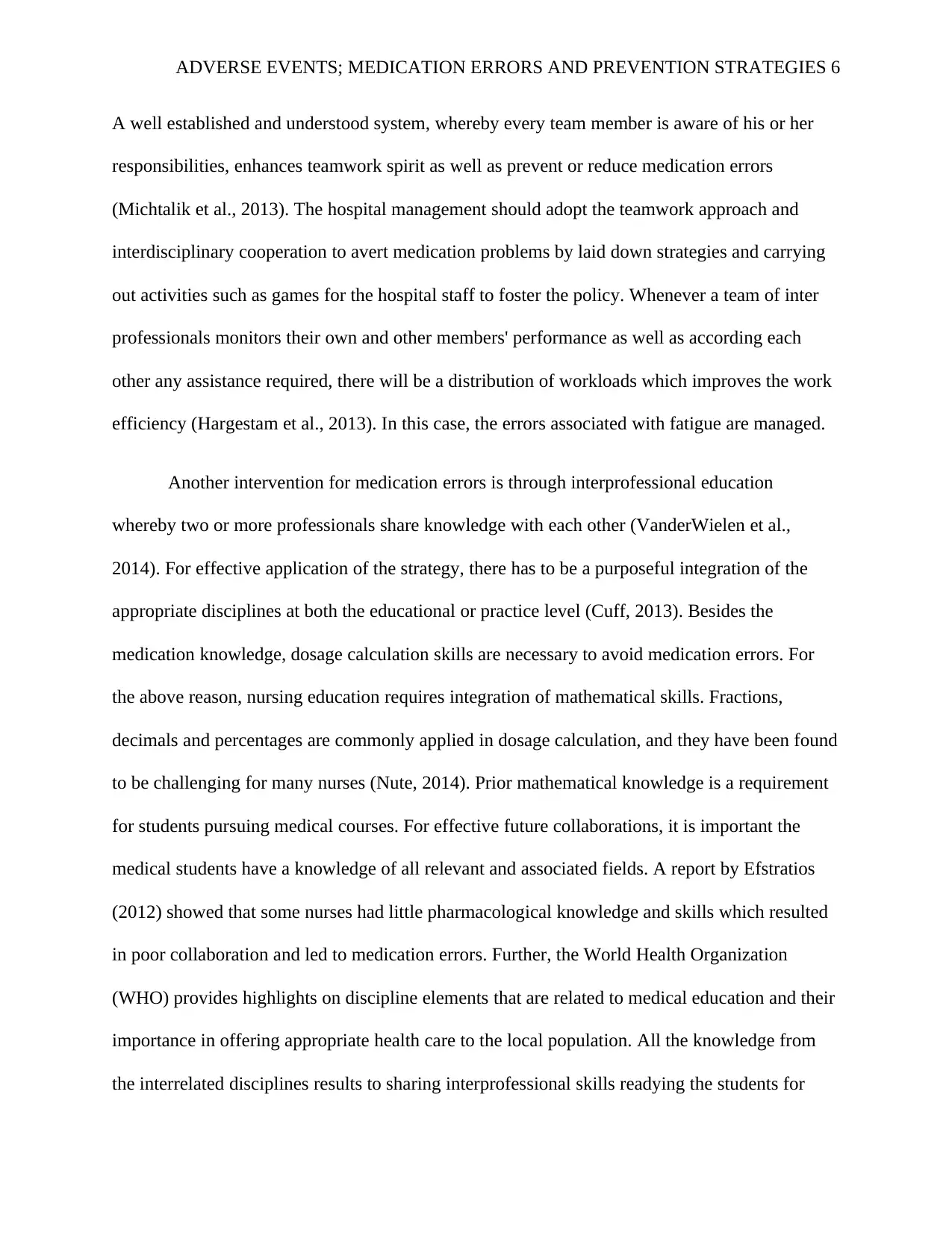
ADVERSE EVENTS; MEDICATION ERRORS AND PREVENTION STRATEGIES 6
A well established and understood system, whereby every team member is aware of his or her
responsibilities, enhances teamwork spirit as well as prevent or reduce medication errors
(Michtalik et al., 2013). The hospital management should adopt the teamwork approach and
interdisciplinary cooperation to avert medication problems by laid down strategies and carrying
out activities such as games for the hospital staff to foster the policy. Whenever a team of inter
professionals monitors their own and other members' performance as well as according each
other any assistance required, there will be a distribution of workloads which improves the work
efficiency (Hargestam et al., 2013). In this case, the errors associated with fatigue are managed.
Another intervention for medication errors is through interprofessional education
whereby two or more professionals share knowledge with each other (VanderWielen et al.,
2014). For effective application of the strategy, there has to be a purposeful integration of the
appropriate disciplines at both the educational or practice level (Cuff, 2013). Besides the
medication knowledge, dosage calculation skills are necessary to avoid medication errors. For
the above reason, nursing education requires integration of mathematical skills. Fractions,
decimals and percentages are commonly applied in dosage calculation, and they have been found
to be challenging for many nurses (Nute, 2014). Prior mathematical knowledge is a requirement
for students pursuing medical courses. For effective future collaborations, it is important the
medical students have a knowledge of all relevant and associated fields. A report by Efstratios
(2012) showed that some nurses had little pharmacological knowledge and skills which resulted
in poor collaboration and led to medication errors. Further, the World Health Organization
(WHO) provides highlights on discipline elements that are related to medical education and their
importance in offering appropriate health care to the local population. All the knowledge from
the interrelated disciplines results to sharing interprofessional skills readying the students for
A well established and understood system, whereby every team member is aware of his or her
responsibilities, enhances teamwork spirit as well as prevent or reduce medication errors
(Michtalik et al., 2013). The hospital management should adopt the teamwork approach and
interdisciplinary cooperation to avert medication problems by laid down strategies and carrying
out activities such as games for the hospital staff to foster the policy. Whenever a team of inter
professionals monitors their own and other members' performance as well as according each
other any assistance required, there will be a distribution of workloads which improves the work
efficiency (Hargestam et al., 2013). In this case, the errors associated with fatigue are managed.
Another intervention for medication errors is through interprofessional education
whereby two or more professionals share knowledge with each other (VanderWielen et al.,
2014). For effective application of the strategy, there has to be a purposeful integration of the
appropriate disciplines at both the educational or practice level (Cuff, 2013). Besides the
medication knowledge, dosage calculation skills are necessary to avoid medication errors. For
the above reason, nursing education requires integration of mathematical skills. Fractions,
decimals and percentages are commonly applied in dosage calculation, and they have been found
to be challenging for many nurses (Nute, 2014). Prior mathematical knowledge is a requirement
for students pursuing medical courses. For effective future collaborations, it is important the
medical students have a knowledge of all relevant and associated fields. A report by Efstratios
(2012) showed that some nurses had little pharmacological knowledge and skills which resulted
in poor collaboration and led to medication errors. Further, the World Health Organization
(WHO) provides highlights on discipline elements that are related to medical education and their
importance in offering appropriate health care to the local population. All the knowledge from
the interrelated disciplines results to sharing interprofessional skills readying the students for
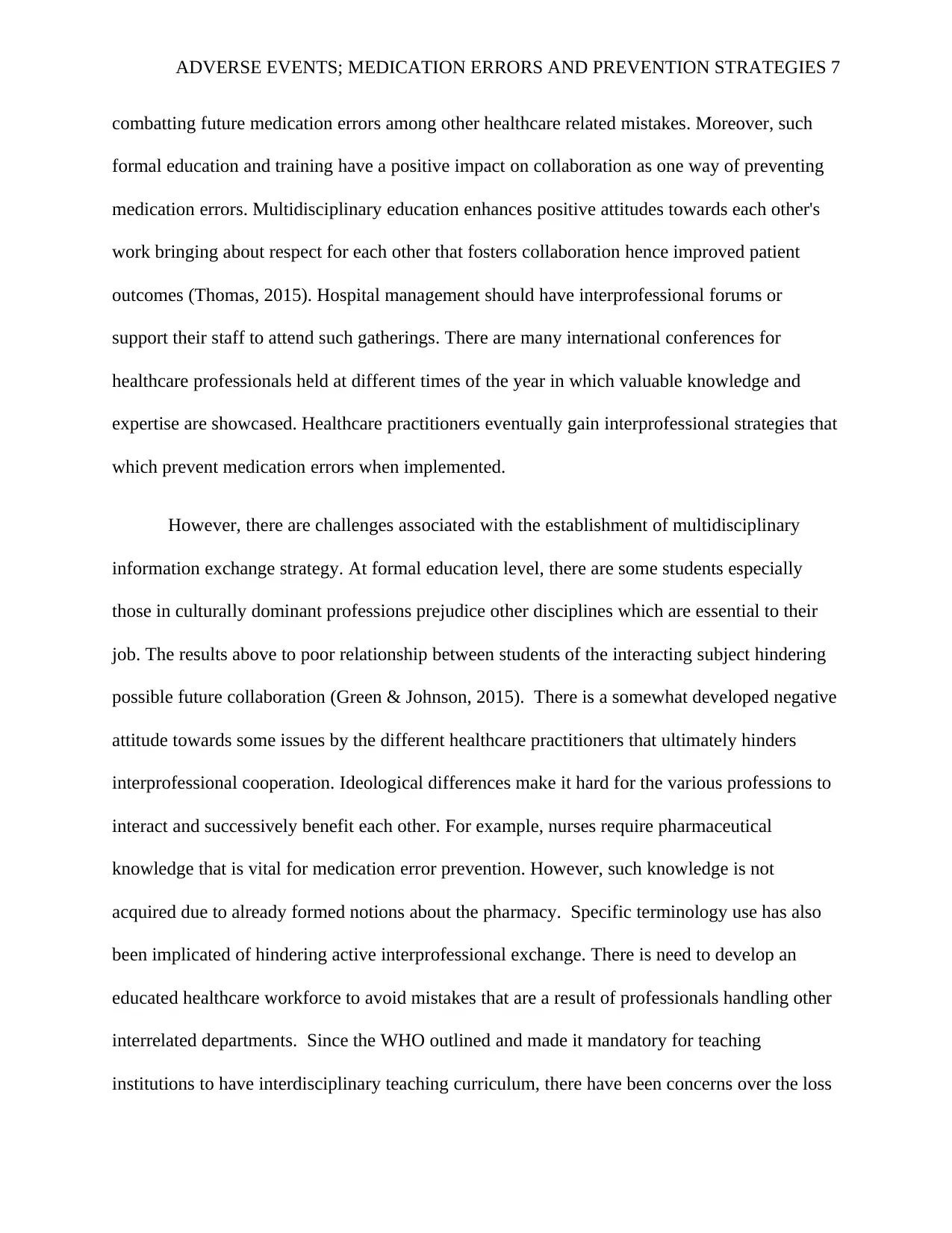
ADVERSE EVENTS; MEDICATION ERRORS AND PREVENTION STRATEGIES 7
combatting future medication errors among other healthcare related mistakes. Moreover, such
formal education and training have a positive impact on collaboration as one way of preventing
medication errors. Multidisciplinary education enhances positive attitudes towards each other's
work bringing about respect for each other that fosters collaboration hence improved patient
outcomes (Thomas, 2015). Hospital management should have interprofessional forums or
support their staff to attend such gatherings. There are many international conferences for
healthcare professionals held at different times of the year in which valuable knowledge and
expertise are showcased. Healthcare practitioners eventually gain interprofessional strategies that
which prevent medication errors when implemented.
However, there are challenges associated with the establishment of multidisciplinary
information exchange strategy. At formal education level, there are some students especially
those in culturally dominant professions prejudice other disciplines which are essential to their
job. The results above to poor relationship between students of the interacting subject hindering
possible future collaboration (Green & Johnson, 2015). There is a somewhat developed negative
attitude towards some issues by the different healthcare practitioners that ultimately hinders
interprofessional cooperation. Ideological differences make it hard for the various professions to
interact and successively benefit each other. For example, nurses require pharmaceutical
knowledge that is vital for medication error prevention. However, such knowledge is not
acquired due to already formed notions about the pharmacy. Specific terminology use has also
been implicated of hindering active interprofessional exchange. There is need to develop an
educated healthcare workforce to avoid mistakes that are a result of professionals handling other
interrelated departments. Since the WHO outlined and made it mandatory for teaching
institutions to have interdisciplinary teaching curriculum, there have been concerns over the loss
combatting future medication errors among other healthcare related mistakes. Moreover, such
formal education and training have a positive impact on collaboration as one way of preventing
medication errors. Multidisciplinary education enhances positive attitudes towards each other's
work bringing about respect for each other that fosters collaboration hence improved patient
outcomes (Thomas, 2015). Hospital management should have interprofessional forums or
support their staff to attend such gatherings. There are many international conferences for
healthcare professionals held at different times of the year in which valuable knowledge and
expertise are showcased. Healthcare practitioners eventually gain interprofessional strategies that
which prevent medication errors when implemented.
However, there are challenges associated with the establishment of multidisciplinary
information exchange strategy. At formal education level, there are some students especially
those in culturally dominant professions prejudice other disciplines which are essential to their
job. The results above to poor relationship between students of the interacting subject hindering
possible future collaboration (Green & Johnson, 2015). There is a somewhat developed negative
attitude towards some issues by the different healthcare practitioners that ultimately hinders
interprofessional cooperation. Ideological differences make it hard for the various professions to
interact and successively benefit each other. For example, nurses require pharmaceutical
knowledge that is vital for medication error prevention. However, such knowledge is not
acquired due to already formed notions about the pharmacy. Specific terminology use has also
been implicated of hindering active interprofessional exchange. There is need to develop an
educated healthcare workforce to avoid mistakes that are a result of professionals handling other
interrelated departments. Since the WHO outlined and made it mandatory for teaching
institutions to have interdisciplinary teaching curriculum, there have been concerns over the loss
Paraphrase This Document
Need a fresh take? Get an instant paraphrase of this document with our AI Paraphraser
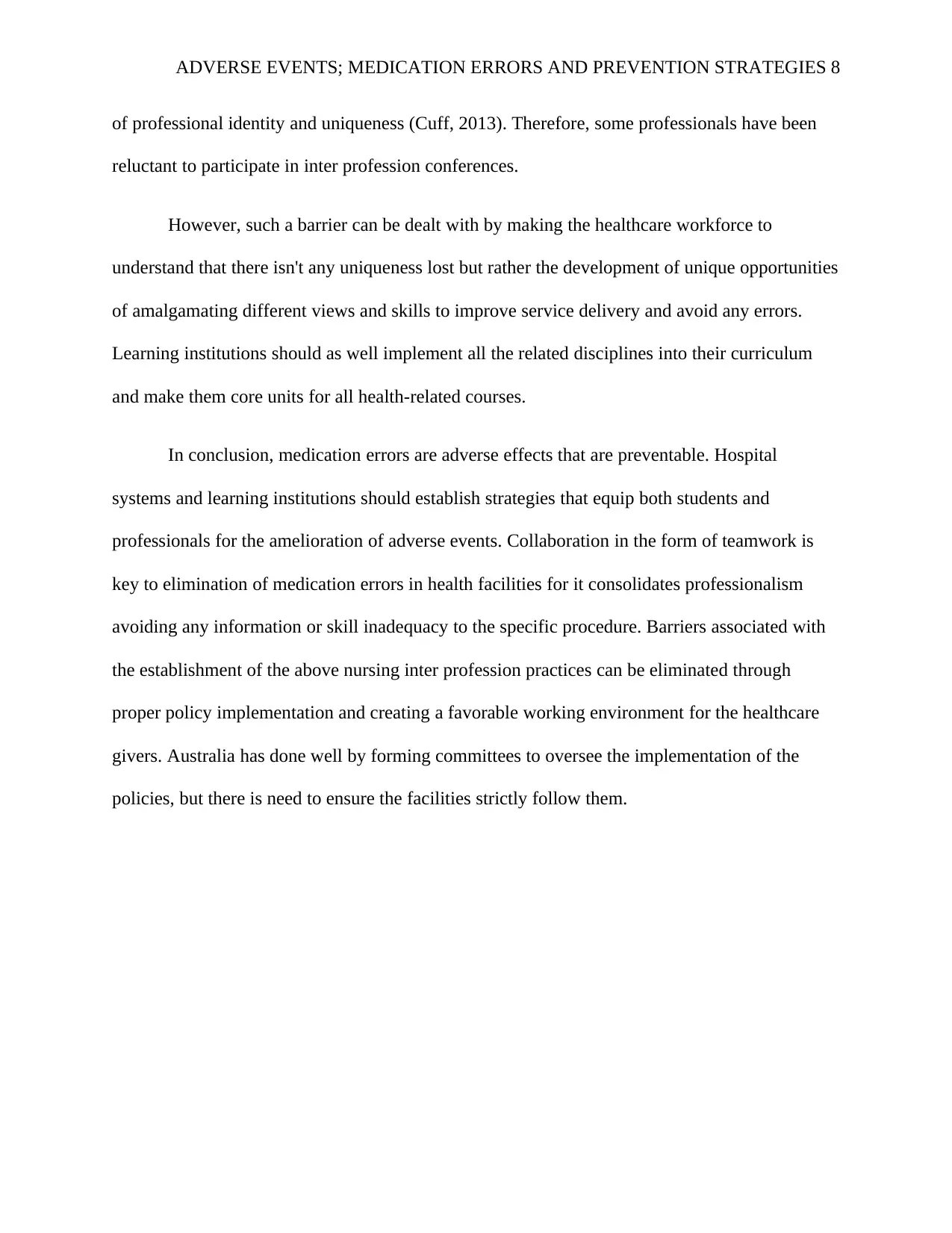
ADVERSE EVENTS; MEDICATION ERRORS AND PREVENTION STRATEGIES 8
of professional identity and uniqueness (Cuff, 2013). Therefore, some professionals have been
reluctant to participate in inter profession conferences.
However, such a barrier can be dealt with by making the healthcare workforce to
understand that there isn't any uniqueness lost but rather the development of unique opportunities
of amalgamating different views and skills to improve service delivery and avoid any errors.
Learning institutions should as well implement all the related disciplines into their curriculum
and make them core units for all health-related courses.
In conclusion, medication errors are adverse effects that are preventable. Hospital
systems and learning institutions should establish strategies that equip both students and
professionals for the amelioration of adverse events. Collaboration in the form of teamwork is
key to elimination of medication errors in health facilities for it consolidates professionalism
avoiding any information or skill inadequacy to the specific procedure. Barriers associated with
the establishment of the above nursing inter profession practices can be eliminated through
proper policy implementation and creating a favorable working environment for the healthcare
givers. Australia has done well by forming committees to oversee the implementation of the
policies, but there is need to ensure the facilities strictly follow them.
of professional identity and uniqueness (Cuff, 2013). Therefore, some professionals have been
reluctant to participate in inter profession conferences.
However, such a barrier can be dealt with by making the healthcare workforce to
understand that there isn't any uniqueness lost but rather the development of unique opportunities
of amalgamating different views and skills to improve service delivery and avoid any errors.
Learning institutions should as well implement all the related disciplines into their curriculum
and make them core units for all health-related courses.
In conclusion, medication errors are adverse effects that are preventable. Hospital
systems and learning institutions should establish strategies that equip both students and
professionals for the amelioration of adverse events. Collaboration in the form of teamwork is
key to elimination of medication errors in health facilities for it consolidates professionalism
avoiding any information or skill inadequacy to the specific procedure. Barriers associated with
the establishment of the above nursing inter profession practices can be eliminated through
proper policy implementation and creating a favorable working environment for the healthcare
givers. Australia has done well by forming committees to oversee the implementation of the
policies, but there is need to ensure the facilities strictly follow them.
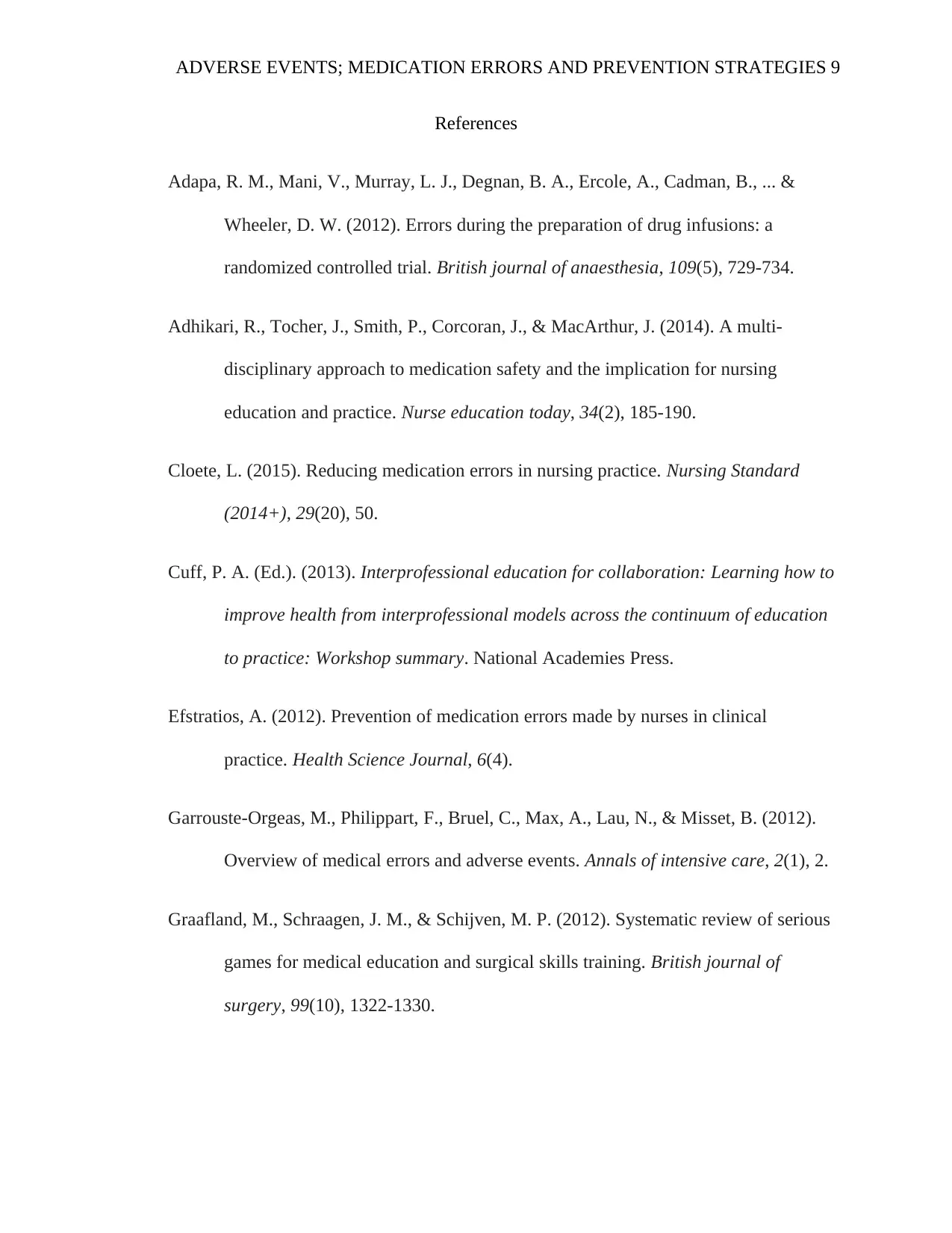
ADVERSE EVENTS; MEDICATION ERRORS AND PREVENTION STRATEGIES 9
References
Adapa, R. M., Mani, V., Murray, L. J., Degnan, B. A., Ercole, A., Cadman, B., ... &
Wheeler, D. W. (2012). Errors during the preparation of drug infusions: a
randomized controlled trial. British journal of anaesthesia, 109(5), 729-734.
Adhikari, R., Tocher, J., Smith, P., Corcoran, J., & MacArthur, J. (2014). A multi-
disciplinary approach to medication safety and the implication for nursing
education and practice. Nurse education today, 34(2), 185-190.
Cloete, L. (2015). Reducing medication errors in nursing practice. Nursing Standard
(2014+), 29(20), 50.
Cuff, P. A. (Ed.). (2013). Interprofessional education for collaboration: Learning how to
improve health from interprofessional models across the continuum of education
to practice: Workshop summary. National Academies Press.
Efstratios, A. (2012). Prevention of medication errors made by nurses in clinical
practice. Health Science Journal, 6(4).
Garrouste-Orgeas, M., Philippart, F., Bruel, C., Max, A., Lau, N., & Misset, B. (2012).
Overview of medical errors and adverse events. Annals of intensive care, 2(1), 2.
Graafland, M., Schraagen, J. M., & Schijven, M. P. (2012). Systematic review of serious
games for medical education and surgical skills training. British journal of
surgery, 99(10), 1322-1330.
References
Adapa, R. M., Mani, V., Murray, L. J., Degnan, B. A., Ercole, A., Cadman, B., ... &
Wheeler, D. W. (2012). Errors during the preparation of drug infusions: a
randomized controlled trial. British journal of anaesthesia, 109(5), 729-734.
Adhikari, R., Tocher, J., Smith, P., Corcoran, J., & MacArthur, J. (2014). A multi-
disciplinary approach to medication safety and the implication for nursing
education and practice. Nurse education today, 34(2), 185-190.
Cloete, L. (2015). Reducing medication errors in nursing practice. Nursing Standard
(2014+), 29(20), 50.
Cuff, P. A. (Ed.). (2013). Interprofessional education for collaboration: Learning how to
improve health from interprofessional models across the continuum of education
to practice: Workshop summary. National Academies Press.
Efstratios, A. (2012). Prevention of medication errors made by nurses in clinical
practice. Health Science Journal, 6(4).
Garrouste-Orgeas, M., Philippart, F., Bruel, C., Max, A., Lau, N., & Misset, B. (2012).
Overview of medical errors and adverse events. Annals of intensive care, 2(1), 2.
Graafland, M., Schraagen, J. M., & Schijven, M. P. (2012). Systematic review of serious
games for medical education and surgical skills training. British journal of
surgery, 99(10), 1322-1330.
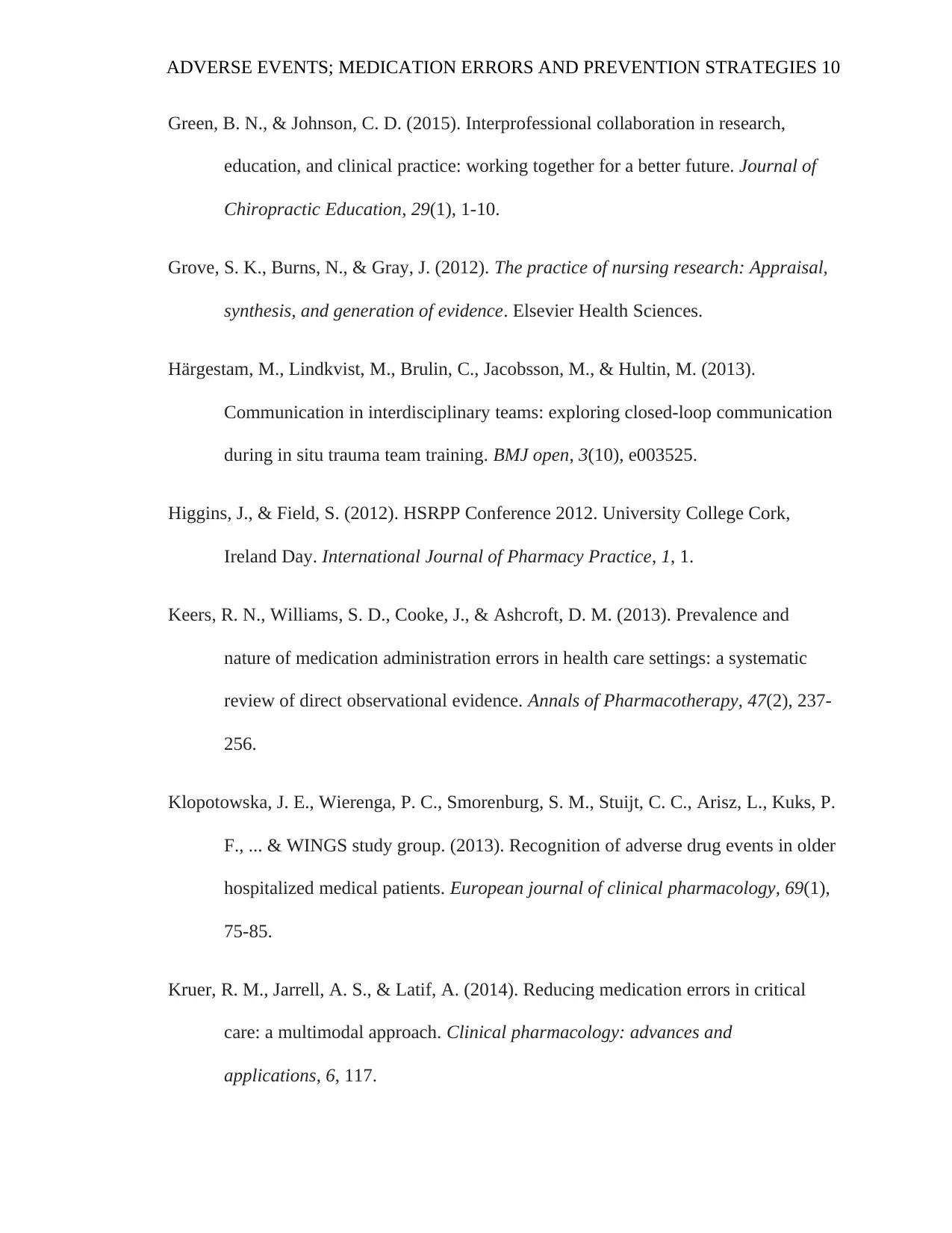
ADVERSE EVENTS; MEDICATION ERRORS AND PREVENTION STRATEGIES 10
Green, B. N., & Johnson, C. D. (2015). Interprofessional collaboration in research,
education, and clinical practice: working together for a better future. Journal of
Chiropractic Education, 29(1), 1-10.
Grove, S. K., Burns, N., & Gray, J. (2012). The practice of nursing research: Appraisal,
synthesis, and generation of evidence. Elsevier Health Sciences.
Härgestam, M., Lindkvist, M., Brulin, C., Jacobsson, M., & Hultin, M. (2013).
Communication in interdisciplinary teams: exploring closed-loop communication
during in situ trauma team training. BMJ open, 3(10), e003525.
Higgins, J., & Field, S. (2012). HSRPP Conference 2012. University College Cork,
Ireland Day. International Journal of Pharmacy Practice, 1, 1.
Keers, R. N., Williams, S. D., Cooke, J., & Ashcroft, D. M. (2013). Prevalence and
nature of medication administration errors in health care settings: a systematic
review of direct observational evidence. Annals of Pharmacotherapy, 47(2), 237-
256.
Klopotowska, J. E., Wierenga, P. C., Smorenburg, S. M., Stuijt, C. C., Arisz, L., Kuks, P.
F., ... & WINGS study group. (2013). Recognition of adverse drug events in older
hospitalized medical patients. European journal of clinical pharmacology, 69(1),
75-85.
Kruer, R. M., Jarrell, A. S., & Latif, A. (2014). Reducing medication errors in critical
care: a multimodal approach. Clinical pharmacology: advances and
applications, 6, 117.
Green, B. N., & Johnson, C. D. (2015). Interprofessional collaboration in research,
education, and clinical practice: working together for a better future. Journal of
Chiropractic Education, 29(1), 1-10.
Grove, S. K., Burns, N., & Gray, J. (2012). The practice of nursing research: Appraisal,
synthesis, and generation of evidence. Elsevier Health Sciences.
Härgestam, M., Lindkvist, M., Brulin, C., Jacobsson, M., & Hultin, M. (2013).
Communication in interdisciplinary teams: exploring closed-loop communication
during in situ trauma team training. BMJ open, 3(10), e003525.
Higgins, J., & Field, S. (2012). HSRPP Conference 2012. University College Cork,
Ireland Day. International Journal of Pharmacy Practice, 1, 1.
Keers, R. N., Williams, S. D., Cooke, J., & Ashcroft, D. M. (2013). Prevalence and
nature of medication administration errors in health care settings: a systematic
review of direct observational evidence. Annals of Pharmacotherapy, 47(2), 237-
256.
Klopotowska, J. E., Wierenga, P. C., Smorenburg, S. M., Stuijt, C. C., Arisz, L., Kuks, P.
F., ... & WINGS study group. (2013). Recognition of adverse drug events in older
hospitalized medical patients. European journal of clinical pharmacology, 69(1),
75-85.
Kruer, R. M., Jarrell, A. S., & Latif, A. (2014). Reducing medication errors in critical
care: a multimodal approach. Clinical pharmacology: advances and
applications, 6, 117.
Secure Best Marks with AI Grader
Need help grading? Try our AI Grader for instant feedback on your assignments.
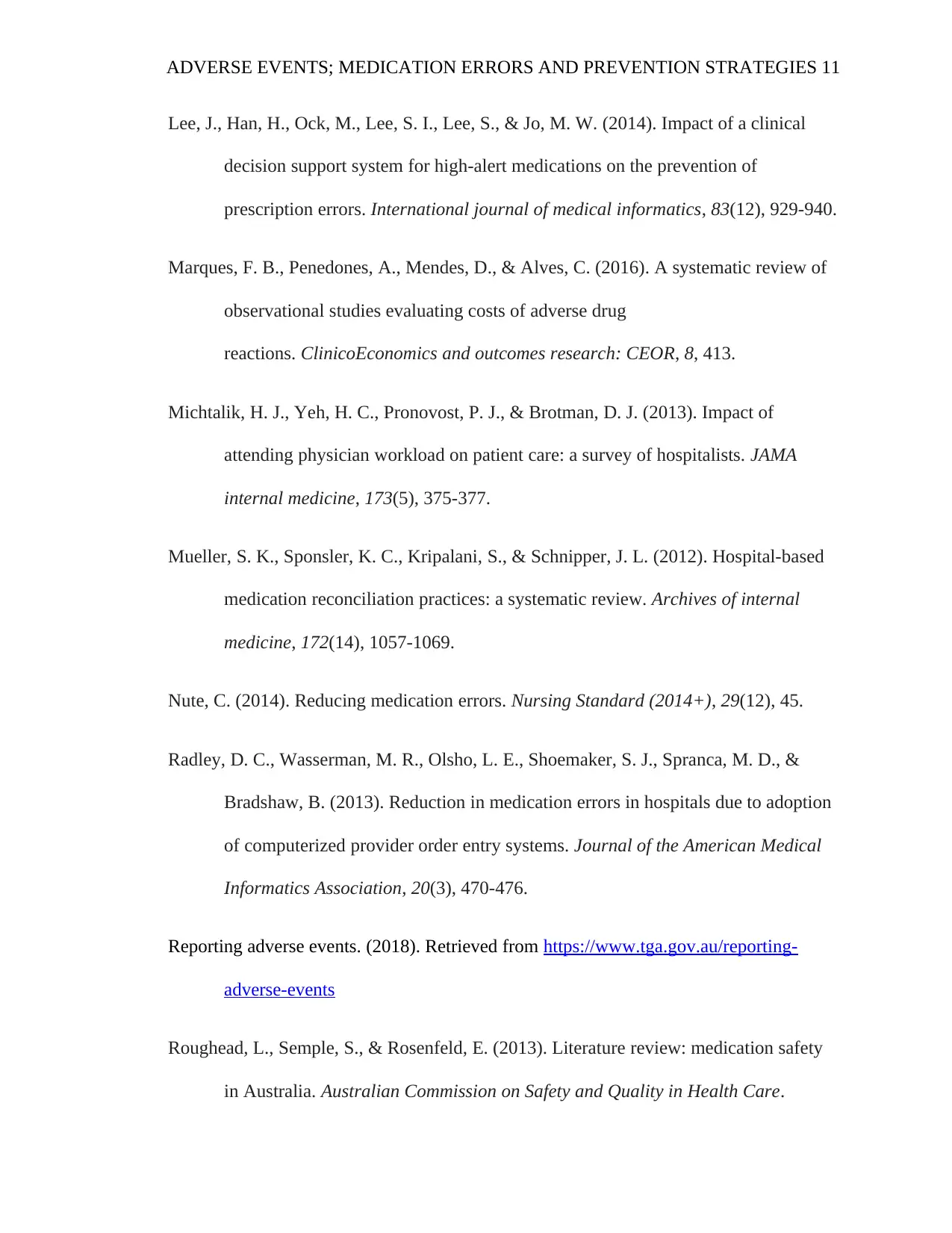
ADVERSE EVENTS; MEDICATION ERRORS AND PREVENTION STRATEGIES 11
Lee, J., Han, H., Ock, M., Lee, S. I., Lee, S., & Jo, M. W. (2014). Impact of a clinical
decision support system for high-alert medications on the prevention of
prescription errors. International journal of medical informatics, 83(12), 929-940.
Marques, F. B., Penedones, A., Mendes, D., & Alves, C. (2016). A systematic review of
observational studies evaluating costs of adverse drug
reactions. ClinicoEconomics and outcomes research: CEOR, 8, 413.
Michtalik, H. J., Yeh, H. C., Pronovost, P. J., & Brotman, D. J. (2013). Impact of
attending physician workload on patient care: a survey of hospitalists. JAMA
internal medicine, 173(5), 375-377.
Mueller, S. K., Sponsler, K. C., Kripalani, S., & Schnipper, J. L. (2012). Hospital-based
medication reconciliation practices: a systematic review. Archives of internal
medicine, 172(14), 1057-1069.
Nute, C. (2014). Reducing medication errors. Nursing Standard (2014+), 29(12), 45.
Radley, D. C., Wasserman, M. R., Olsho, L. E., Shoemaker, S. J., Spranca, M. D., &
Bradshaw, B. (2013). Reduction in medication errors in hospitals due to adoption
of computerized provider order entry systems. Journal of the American Medical
Informatics Association, 20(3), 470-476.
Reporting adverse events. (2018). Retrieved from https://www.tga.gov.au/reporting-
adverse-events
Roughead, L., Semple, S., & Rosenfeld, E. (2013). Literature review: medication safety
in Australia. Australian Commission on Safety and Quality in Health Care.
Lee, J., Han, H., Ock, M., Lee, S. I., Lee, S., & Jo, M. W. (2014). Impact of a clinical
decision support system for high-alert medications on the prevention of
prescription errors. International journal of medical informatics, 83(12), 929-940.
Marques, F. B., Penedones, A., Mendes, D., & Alves, C. (2016). A systematic review of
observational studies evaluating costs of adverse drug
reactions. ClinicoEconomics and outcomes research: CEOR, 8, 413.
Michtalik, H. J., Yeh, H. C., Pronovost, P. J., & Brotman, D. J. (2013). Impact of
attending physician workload on patient care: a survey of hospitalists. JAMA
internal medicine, 173(5), 375-377.
Mueller, S. K., Sponsler, K. C., Kripalani, S., & Schnipper, J. L. (2012). Hospital-based
medication reconciliation practices: a systematic review. Archives of internal
medicine, 172(14), 1057-1069.
Nute, C. (2014). Reducing medication errors. Nursing Standard (2014+), 29(12), 45.
Radley, D. C., Wasserman, M. R., Olsho, L. E., Shoemaker, S. J., Spranca, M. D., &
Bradshaw, B. (2013). Reduction in medication errors in hospitals due to adoption
of computerized provider order entry systems. Journal of the American Medical
Informatics Association, 20(3), 470-476.
Reporting adverse events. (2018). Retrieved from https://www.tga.gov.au/reporting-
adverse-events
Roughead, L., Semple, S., & Rosenfeld, E. (2013). Literature review: medication safety
in Australia. Australian Commission on Safety and Quality in Health Care.
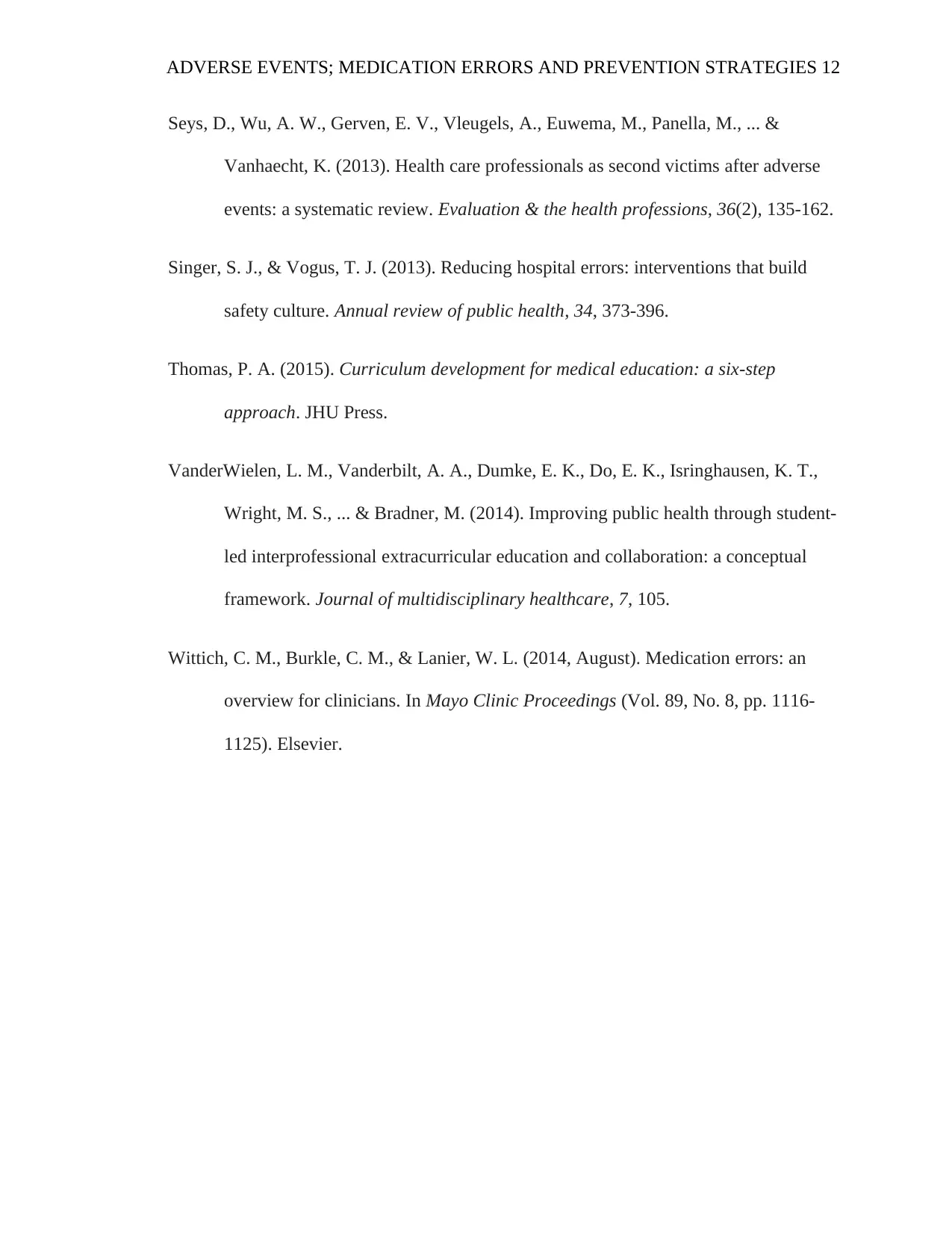
ADVERSE EVENTS; MEDICATION ERRORS AND PREVENTION STRATEGIES 12
Seys, D., Wu, A. W., Gerven, E. V., Vleugels, A., Euwema, M., Panella, M., ... &
Vanhaecht, K. (2013). Health care professionals as second victims after adverse
events: a systematic review. Evaluation & the health professions, 36(2), 135-162.
Singer, S. J., & Vogus, T. J. (2013). Reducing hospital errors: interventions that build
safety culture. Annual review of public health, 34, 373-396.
Thomas, P. A. (2015). Curriculum development for medical education: a six-step
approach. JHU Press.
VanderWielen, L. M., Vanderbilt, A. A., Dumke, E. K., Do, E. K., Isringhausen, K. T.,
Wright, M. S., ... & Bradner, M. (2014). Improving public health through student-
led interprofessional extracurricular education and collaboration: a conceptual
framework. Journal of multidisciplinary healthcare, 7, 105.
Wittich, C. M., Burkle, C. M., & Lanier, W. L. (2014, August). Medication errors: an
overview for clinicians. In Mayo Clinic Proceedings (Vol. 89, No. 8, pp. 1116-
1125). Elsevier.
Seys, D., Wu, A. W., Gerven, E. V., Vleugels, A., Euwema, M., Panella, M., ... &
Vanhaecht, K. (2013). Health care professionals as second victims after adverse
events: a systematic review. Evaluation & the health professions, 36(2), 135-162.
Singer, S. J., & Vogus, T. J. (2013). Reducing hospital errors: interventions that build
safety culture. Annual review of public health, 34, 373-396.
Thomas, P. A. (2015). Curriculum development for medical education: a six-step
approach. JHU Press.
VanderWielen, L. M., Vanderbilt, A. A., Dumke, E. K., Do, E. K., Isringhausen, K. T.,
Wright, M. S., ... & Bradner, M. (2014). Improving public health through student-
led interprofessional extracurricular education and collaboration: a conceptual
framework. Journal of multidisciplinary healthcare, 7, 105.
Wittich, C. M., Burkle, C. M., & Lanier, W. L. (2014, August). Medication errors: an
overview for clinicians. In Mayo Clinic Proceedings (Vol. 89, No. 8, pp. 1116-
1125). Elsevier.
1 out of 12
Related Documents
Your All-in-One AI-Powered Toolkit for Academic Success.
+13062052269
info@desklib.com
Available 24*7 on WhatsApp / Email
![[object Object]](/_next/static/media/star-bottom.7253800d.svg)
Unlock your academic potential
© 2024 | Zucol Services PVT LTD | All rights reserved.





